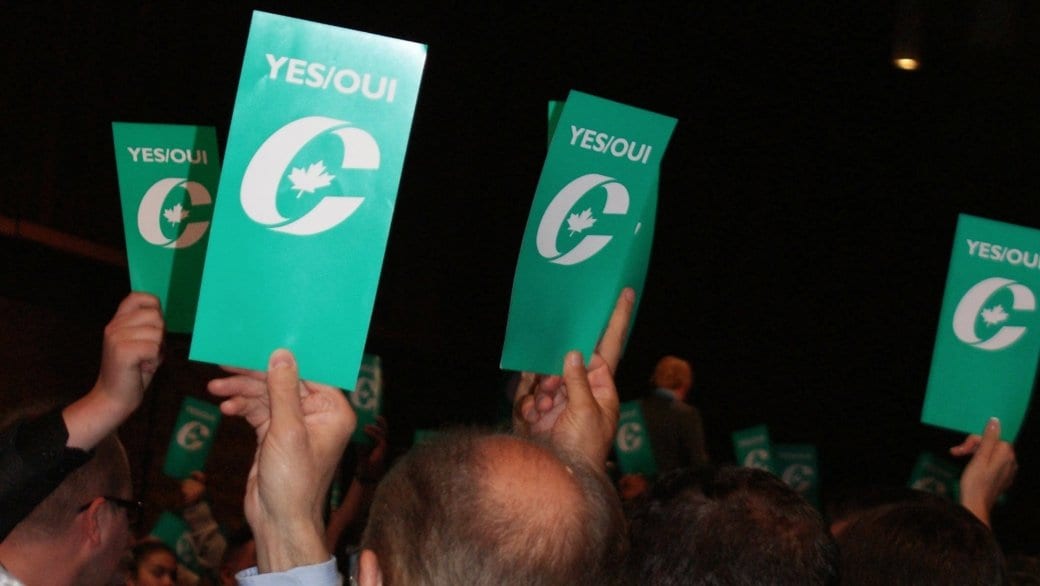In the wake of Stephen Harper’s leadership, the Conservative Party he helped rebuild voted down its long-standing policy against same-sex marriage in a vote of 1,036 to 462 at its national convention in Vancouver, May 28, 2016.
A simple show of ballot cards was deemed insufficient to determine the vote so the policy resolution went to electronic voting.
Cheers erupted as the numbers came up on the screens.

(The motion to drop the party’s one man-one woman definition of marriage passed by a wide margin./Jeremy Hainsworth/Daily Xtra)
“I’m elated,” gay Conservative activist Fred Litwin tells Daily Xtra. “This is the new reality of the Conservative Party. It’s cleaning up a remnant that needed to be cleaned up.”
Removed from the old policy is the line: “We support legislation defining marriage as the union of one man and one woman.”
Litwin considers it more of a housekeeping issue, simply to clean up an old policy.
“It’s been the law of Canada for 10 years,” he points out. “Social conservatives won’t leave the party. It’s an empty threat.”
“From now on, people won’t be able to say the Conservatives are anti-gay,” he says.
In his speech to delegates at the Fabulous Blue Tent party on May 27, Litwin thanked members of LGBTory and several party members by name, including former foreign affairs minister John Baird, for all their hard work lobbying for the resolution’s passage.

(A lobbying card from LGBTory sitting on a table at the Fabulous Blue Tent party urged delegates to vote on “the right side of history.”/Robin Perelle/Daily Xtra)
The policy change comes 11 years after same-sex marriage was legalized in Canada under Liberal Prime Minister Paul Martin.
While the resolution’s passage changes the party’s policy on marriage, the party retains its support for religious organizations that “refuse to perform unions or allow the use of their facilities for events that are incompatible with their beliefs.”
To get to the main Conservative Party conference floor for a vote, the marriage resolution first had to get through a policy working group May 27. There, it was standing room only, the atmosphere tense. But in the end, delegates voted 297-143 to drop the old definition of marriage from the party’s policy book.
That vote moved the issue to the party’s main floor, where debate from the Yes and No sides was passionate May 28.
Many on the Yes side said it was time for the party to recognize the rights of consenting adults.

(MP Maxime Bernier spoke in favour of the resolution to drop the old definition of marriage./Jeremy Hainsworth/Daily Xtra)
Quebec MP and party leadership candidate Maxime Bernier told delegates Canadians have the right to love who they want and to be who they are.
“I believe in freedom,” he said.
Alberta MP and potential leadership candidate Michelle Rempel also supported the policy change. “It’s long past time we passed this resolution,” she said.
Jason Kenney, former minister of citizenship and immigration and another potential leadership contender, also supported the motion, calling the party’s stance against same-sex marriage “obsolete.”
The vote came 49 years after Liberal justice minister Pierre Trudeau said the state has no place in the bedrooms of the nation. That sentiment was echoed from the convention floor.
“I come from a country where homosexuals are hanged,” Goldie Gharmari, of Nepean, Ontario, told delegates. “The government does it.”

(Delegate Goldie Gharmari, originally from Iran, said same-sex marriage is a right./Jeremy Hainsworth/Daily Xtra)
“It is a fundamental human right and the government does not have a place in the bedrooms of a nation,” said Gharmari, who was born in Iran.
Other Conservative Party delegates weren’t so keen on the proposed change. Some said the party should continue to welcome all conservatives, and not give way to factions such as LGBT groups.
For Paul Tolnai, former Conservative riding association president in Vancouver Centre, the resolution’s passage is merely the extension of the direction the party took nine years ago.
Then-Prime Minister Stephen Harper said the issue was dead in 2007, Tolnai says.
“The issue is dead,” he repeats. “We proved it true today.”
But, he acknowledges, the question of same-sex marriage still elicits a lot of emotion in the party.
He notes several hundred delegates left the conference floor immediately after the vote.
Liberal MP Hedy Fry, who represents Vancouver Centre, tells Xtra she doesn’t know why the Conservatives are even debating the issue.
“These things people are debating just aren’t debatable anymore,” she says.

 Why you can trust Xtra
Why you can trust Xtra


